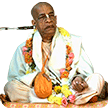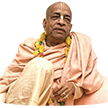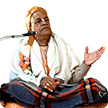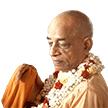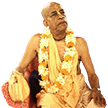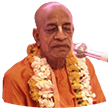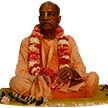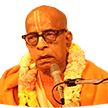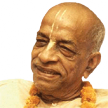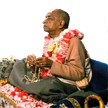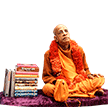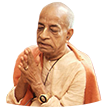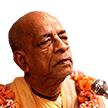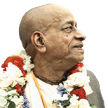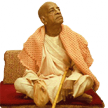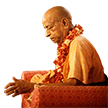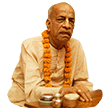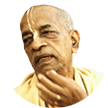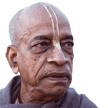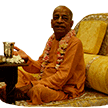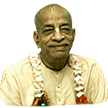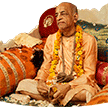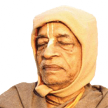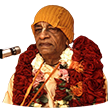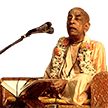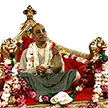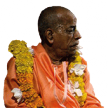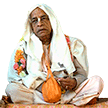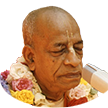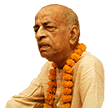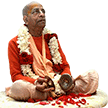A Month in the Life of Srila Prabhupada - December 1970
The Months in the Life of Srila Prabhupada present 2200+ of his lectures; 905+ of his conversations; 490+ of his morning walks;
65+ of his interviews and 6,570+ of his letters. This listing covers all available material,
- and includes:
- 10,300+ links to Vanisource - our repository of all of Srila Prabhupada's words;
- 470+ short audio clips Nectar Drops from Srila Prabhupada sprinkled throughout the months;
- 1,080 short video clips extracted from lectures, conversations, morning walks or interviews with subtitles in up to 93 languages sprinkled throughout the months;
- 13,350+ concise statements, drawn from Srila Prabhupada's lectures, conversations and letters are highlighted within quoteboxes;
- For further study on the different subjects addressed, each statement links to the various categories in our thematic section of Vanipedia named Vaniquotes;
These statements from the Months in the Life of Srila Prabhupada offer unparalleled insights into his devotional character; his vision to re-spiritualize human society; his dedication to translate, publish & distribute his books; his expertise to tirelessly lead & manage his worldwide movement; his empowered ability to encourage, care for, train & clearly communicate the disciplines he expects from all his disciples as he engages them in their pursuit of Krsna consciousness & performance of missionary activities. Through all these situations one can also experience how Srila Prahhupada consistently represents the pure teachings of Lord Caitanya Mahaprabhu and His associates.
- See also: A Day in the Life of Srila Prabhupada
- See also: the Timeline of Srila Prabhupada's Life - December 1970
Dec 1 to 2 - Bombay
1970 - December 01
 1970 - December 02
1970 - December 02
Dec 3 to 15 - Indore
 1970 - December 05
1970 - December 05
 1970 - December 07
1970 - December 07
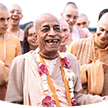 vanipedia.org |
Regarding telephone at Seksaria House or anywhere else, don't try to use telephone unnecessarily. |
 1970 - December 09
1970 - December 09
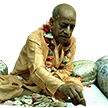 vanipedia.org |
In Indore we shall continue our program up until the 16th and therefore we shall start on the 17th to Bhopal. |
 1970 - December 10
1970 - December 10
 1970 - December 11
1970 - December 11
| Nectar Drops from Srila Prabhupada |
| "So we are very much concerned to preach the message of Lord Kṛṣṇa, Bhagavad-gītā. We are presenting Bhagavad-gītā as it is, without any malinterpretation. We cannot interpret on the words of God. Because religion means the words of God. Dharmaṁ tu sākṣād bhagavat-praṇītam (SB 6.3.19). The principles of religion cannot be made by any human being, as much as law cannot be made by the citizens. Law is made by the government. That law is accepted. That is obligatory. Similarly, religion means the words of God." |
| 701211 - Lecture - Speech to Their Highnesses - Indore |
 1970 - December 12
1970 - December 12
| Nectar Drops from Srila Prabhupada |
| "This is the beginning of sadācāra: to rise early in the morning, to cleanse, then chant, or chant the Vedic mantras or, simplified as in the present age, Hare Kṛṣṇa mantra, mahā-mantra. This is the beginning of sadācāra. So sadācāra means to become freed from sinful reaction. Unless one follows the regulative principles he cannot be freed. And unless one is fully freed from sinful reaction, he cannot understand what is God. Those who are not in sadācāra, regulative principles, for them... Just like animals, they are not expected to follow any... Of course, by nature they follow regulative principles. Still, but human beings, having advanced consciousness, so instead of using it properly, they misuse the advanced consciousness, and thus they become lower than animals." |
| 701212 - Lecture SB 06.01.21 and Conversation - Indore |
 1970 - December 13
1970 - December 13
| Nectar Drops from Srila Prabhupada |
| "Whatever abominable characteristics we have developed, if we want to counteract it, we have to take to bhakti-yoga only. Anartha. Anartha. We have developed so many anartha. We don't require it, but we have developed all these symptoms. So anartha upaśamam. So if you want to cut down these anarthas, then bhakti-yogam adhokṣaje—you have to accept this bhakti-yoga principle to the adhoksaja." |
| 701213 - Lecture SB 06.01.22-25 - Indore |
| Nectar Drops from Srila Prabhupada |
| "Manuṣyāṇāṁ sahasreṣu kaścid yatati siddhaye (BG 7.3). This cultivation of spiritual knowledge means perfection of life. But people do not try for it. Therefore Gītā says, manuṣyāṇāṁ sahasreṣu: "Out of many thousands of men, one may try to cultivate knowledge for spiritual advancement." And yatatām api siddhānāṁ (BG 7.3): 'Out of many such persons who are cultivating spiritual knowledge, hardly one can understand what is Kṛṣṇa'." |
| 701213 - Conversation B - Indore |
 1970 - December 14
1970 - December 14
| Nectar Drops from Srila Prabhupada |
| "If somebody gives some medicine that one can make himself immortal, that is another thing. Nobody is going to be immortal. Why he should be afraid of death? Death will take place. "As sure as death." So today or tomorrow or hundred years after. So if one moment is utilized for Kṛṣṇa consciousness, that makes life successful. Why shall I live for hundred years, waste my time? One moment is sufficient for living." |
| 701214 - Conversation A - Indore |
 1970 - December 15
1970 - December 15
Dec 15 to 31 - Surat
 1970 - December 15
1970 - December 15
| Nectar Drops from Srila Prabhupada |
| "So long we think of becoming master, that is materialist. If one thinks, "Oh, I have become spiritual master and have so many disciples, they are my servants," and that is also material. Therefore according to our Vaiṣṇava, the address is prabhu. Even a spiritual master addresses the disciple as prabhu. This very mentality to become master is material." |
| 701215 - Conversation - Indore |
| Nectar Drops from Srila Prabhupada |
| "Yaṁ yaṁ vāpi smaran loke tyajaty ante kalevaram (BG 8.6). This practice means at the time of death if one can remember Kṛṣṇa, Nārāyaṇa, then his whole life is successful. At the time of death. Because the mentality, status of the mind at the time of death, will carry him to the next life. Just like the flavor is carried by the air, similarly, my mentality will carry me to a different type of body. If I have created my mentality like Vaiṣṇava, pure devotee, then I shall immediately transfer to Vaikuṇṭha. If I created my mind as an ordinary karmī, then I will have to stay within this material world to enjoy the type of mentality which I have created." |
| 701215 - Lecture SB 06.01.27 - Indore |
 1970 - December 16
1970 - December 16
| Nectar Drops from Srila Prabhupada |
| "Kṛṣṇa can be worshiped, Kṛṣṇa can be loved, by any capacity. The gopīs loved Kṛṣṇa out of seemingly lust, lusty desires, and Śiśupāla remembered Kṛṣṇa out of anger. Kāmāt krodhād bhayāt. And Kaṁsa remembered always Kṛṣṇa out of fear. And of course they were not devotees. Devotees means they should be always favorably disposed to Kṛṣṇa, not inimical. But Kṛṣṇa is so kind, even somebody is disposed to Him in an inimical attitude, he also gets salvation." |
| 701216 - Lecture SB 06.01.27-34 - Surat |
 1970 - December 17
1970 - December 17
 1970 - December 18
1970 - December 18
 1970 - December 19
1970 - December 19
| Nectar Drops from Srila Prabhupada |
| "There are twelve authorities mentioned in the śāstras. Brahmā is one authority, Lord Śiva is one authority and Nārada is one authority. Then Manu is one authority, Prahlāda Mahārāja is authority, Bali Mahārāja is authority, Śukadeva Gosvāmī is authority. So similarly, Yamarāja is also authority. They are authorities who know exactly what is God, or Kṛṣṇa, and they can direct. Therefore śāstra says you have to follow the authorities. Otherwise it is not possible. Dharmasya tattvaṁ nihitaṁ guhāyāṁ mahājano yena gataḥ sa panthāḥ (CC Madhya 17.186). You cannot understand the path of religion by your mental speculation. Dharmāṁ tu sākṣād bhagavat-praṇītam (SB 6.3.19). Dharma, religious principles, are enacted by the Supreme Personality of Godhead. No ordinary man can enact dharma." |
| 701219 - Lecture SB 06.01.34-39 - Surat |
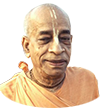 vanipedia.org |
Husband and wife working conjointly in Krishna Consciousness is the perfection of household life. |
 1970 - December 20
1970 - December 20
| Nectar Drops from Srila Prabhupada |
| "You may have very good medicines, drug shop, as you have got in your country, but still you have to suffer from diseases. You may have thousands of method for contraceptive, but the population is increased. Ah. And as soon as there is death, as soon as this body, the janma-mṛtyu-jarā-vyādhi (BG 13.9). In the Bhagavad-gītā everything is clearly stated, that any intelligent person will put forward before him that "We have solved all our miserable conditions of life, but not these four principles. That is not possible," janma-mṛtyu-jarā-vyādhi: the sufferings of birth, the sufferings of death, the sufferings of old age and the sufferings of disease. That cannot be stopped. That can only be solved if you become Kṛṣṇa conscious and go back to home, back to Godhead, that's all. Otherwise it is not possible." |
| 701220 - Lecture SB 06.01.38 - Surat |
 1970 - December 21
1970 - December 21
| Nectar Drops from Srila Prabhupada |
| "Guru means you have to find out some personality who is well-versed in the Vedic knowledge. Śābde pare ca niṣṇātaṁ brahmaṇy upaśamāśrayam. These are the symptoms of guru: that he is well versed, well cognizant in the conclusion of the Vedas. Not only that he is well versed, but he has actually in his life taken to that path, upaśamāśrayam, without being deviated by any other ways. Upaśama, upaśama. He has finished all material hankerings. He has taken simply to the spiritual life and simply surrendered to the Supreme Personality of Godhead. And at the same time, he knows all the Vedic conclusions. This is the description of a guru." |
| 701221 - Lecture SB 06.01.39-40 - Surat |
| Nectar Drops from Srila Prabhupada |
| "There is a word in the Śrīmad-Bhāgavatam, uru-dāmni baddhāḥ. Uru. Uru means very strong, and dāmni means rope. Just like if you are tied up with a strong rope, hands and feet, as you are helpless, our position is like that. This very word is used, uru-dāmni baddhāḥ. Na te viduḥ... And such baddha, conditioned souls, they are declaring freedom: "I don't care for anyone. I don't care for God." How much foolishness. Just like sometimes naughty children, they are also bound up. Yaśodāmayī also bound up Kṛṣṇa. That is an Indian system, for everywhere, (chuckles) tied up. And that small child, when it is bound up, if that child declares freedom, how it is possible? Similarly, by the laws of Mother Nature we are bound up. How you can declare freedom? Every part of our body is being controlled by some controller. That is stated in the Bhāgavatam." |
| 701221 - Conversation A - Surat |
| Nectar Drops from Srila Prabhupada |
| "'Anyone', Kṛṣṇa says, 'who is thinking of Me always within his heart, with devotion and love, he is the topmost yogī'. Yoginām api sarveṣāṁ. So this Hare Kṛṣṇa movement, as soon as you chant "Kṛṣṇa" and hear it, immediately you think of. And the chanting is not done by any ordinary man. Unless one has love and devotion for Kṛṣṇa, he cannot chant. You just study with this verse. Śraddhāvān bhajate yo mam, āntarātmanā: "Within, he is topmost." So this Kṛṣṇa consciousness movement means we are training people to become the topmost yogīs." |
| 701221 - Conversation B - Surat |
 1970 - December 22
1970 - December 22
| Nectar Drops from Srila Prabhupada |
| "So every religion, the highest principle of any religion is there in Vaiṣṇavites, or the followers of Kṛṣṇa consciousness. Any best thing, in any religion, you will find in Kṛṣṇa consciousness. Therefore it is perfect. Buddha religion teaches ahiṁsā; the Kṛṣṇa conscious people are ahiṁsā. Lord Jesus teaches love of God; they are the best lover of God. And Hindu religion teaches liberation; they are... As soon as they become Kṛṣṇa conscious, immediately they are liberated. Immediately, instantly. There is no question of asking for liberation." |
| 701222 - Lecture SB 06.01.40 - Surat |
 1970 - December 23
1970 - December 23
| Nectar Drops from Srila Prabhupada |
| "So when we are in ignorance... Everyone commits sin or criminal activities simply by ignorance. Ignorance. Just like by ignorance a child touches a fire. The fire will not excuse. Because it is a child, he does not know, therefore the fire excuses? It does not burn his hand? No. Even it is child, the fire must act. It burns. Similarly, ignorance is no excuse of law. If you commit some sin and go to the law court, and if you plead, "Sir, I did not know this law," that is no excuse. You have committed this criminal activity; even though you did not know the law, that does not mean you will be excused. Therefore all sinful activities are done in ignorance or in mixed-up passion and ignorance. Therefore one has to raise himself to the quality of goodness. He must be good, very good man. And if you want to become very good man, then you have to follow these regulative principles: no illicit sex life, no meat-eating, no intoxication, no gambling. These are the four pillars of sinful life. If you indulge in these four principles of sinful life, you cannot become a good man." |
| 701223 - Lecture SB 06.01.41-42 - Surat |
 1970 - December 24
1970 - December 24
| Nectar Drops from Srila Prabhupada |
| "So the Kṛṣṇa consciousness movement means to understand Kṛṣṇa, to understand one's own position in relationship with Kṛṣṇa, and to act accordingly and then attain the highest perfection of life. That is prayojana. In Sanskrit it is called sambandha, abhidheya and prayojana. We must first of all know what is our relationship with Kṛṣṇa, or God; then abhidheya—then according to that relationship we have to act. And if we properly act, then the ultimate goal of life is achieved. What is that ultimate goal of life? The ultimate goal of life is to go home, go back to home, back to Godhead." |
| 701224 - Lecture at MPV Collage - Surat |
| Nectar Drops from Srila Prabhupada |
| "Our actual relationship with Kṛṣṇa we have forgotten; therefore Kṛṣṇa comes personally sometimes, just like Kṛṣṇa came, and He teaches. He leaves behind Him the Bhagavad-gītā to remind us about our relationship with Kṛṣṇa, and He requests that "Please give up all your nonsense engagement as hogs. Please come back to Me; I shall give you protection," sarva-dharmān parityajya (BG 18.66). That is Kṛṣṇa's business, because Kṛṣṇa is the father of all living entities. He is not happy that all these living entities are rotting as hogs in this material world. Therefore it is His business. He comes personally sometimes; He sends His representative, He sends His son, just like Lord Jesus Christ. He claims that he is the son. This is quite possible, that... Everyone is son, but this son means a particular favorite son who is sent to a particular place to reclaim them back to home, back to Godhead." |
| 701224 - Lecture SB 06.01.42-43 - Surat |
 1970 - December 25
1970 - December 25
 1970 - December 26
1970 - December 26
| Nectar Drops from Srila Prabhupada |
| "Those who are actually intelligent, sarva-dharmān parityajya mām ekaṁ (BG 18.66), he worships Kṛṣṇa, that's all. He is actually intelligent, because his result is permanent. If one worships Kṛṣṇa according to the system, then tyaktvā dehaṁ punar janma naiti (BG 4.9). That is the solution. So after this body, he is no more coming to this material world. Therefore that is real solution of life." |
| 701226 - Lecture SB 06.01.44 - Surat |
 1970 - December 27
1970 - December 27
| Nectar Drops from Srila Prabhupada |
| "We are enjoying. What is this material activity? They are enjoying. This material, this house, "I have got a very nice house, skyscraper." So I am the enjoyer. But I have selected all this iron, wood, earth, bricks, and there are these five materials; I take the earth and mix it with water, I dry it with fire, so brick is made. Similarly, the cement is made. Then we bring together and make a very nice house, and I think, "I am enjoying. I am enjoying." I am not enjoying; I am spoiling my energy, that's all. The ingredients are supplied by nature, prakṛteḥ kriyamāṇāni. Prakṛti, in one sense prakṛti helps you, and you are thinking, or I am thinking, that I am the enjoyer" |
| 701227 - Lecture - Surat |
 1970 - December 28
1970 - December 28
 1970 - December 29
1970 - December 29
 1970 - December 30
1970 - December 30
 1970 - December 31
1970 - December 31
| Nectar Drops from Srila Prabhupada |
| "Just like here also it is said here that "I am a debtor, and if I do not pay, I will be arrested or I will be punished by the courts, by the law." And there it is said that sa tat-phalaṁ bhuṅkte, that as you cheat, as you suffer in this life, similarly, tathā tāvat amutra vai, similarly one has to suffer in the next life. Because life is eternal, and we are changing our body, tathā dehāntara-prāptiḥ (BG 2.13). These things are not discussed amongst so-called educated person, that life is continuous; we are changing bodies every moment; therefore we have to change this body and have to accept another body and another accept another body. Suppose I am sitting in this room, if I change this room I go to another room, that does not mean that I have become free from all my obligations." |
| 701231- Lecture SB 06.01.45-50 - Surat |
 vanipedia.org |
Once a temple has been opened it must never be closed. So if you are confident in this regard, then continue as planned. |

